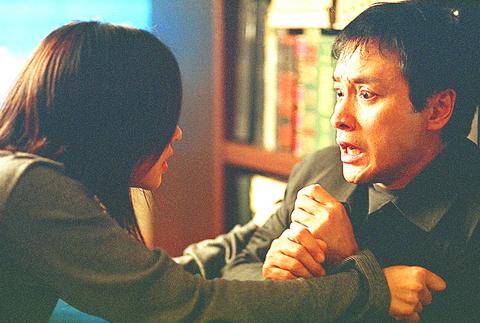Ghost films have become a trend in Hong Kong filmmaking and something a money making machine at the box office. But making all this "ghost money" might, for the superstitious Hong Kong film industry, have inauspicious effects.
In Inner Senses (

PHOTO COURTESY OF GROUP POWER
According to Hong Kong media, making this ghost film might have damaged Cheung's acting career, which is currently in transition as he angles to become a film director.
In the film, Cheung plays a psychiatrist who is treating Lam, a young woman suffering from constant hallucinations and panic attacks. Cheung convinces himself that the symptoms are caused by Lam's traumatized family life and her love affairs, and that by falling in love with her, he will be able to rescue her from falling into a psychological black hole.
Then the inconceivable happens. The psychiatrist starts to see the ghost of his high school girlfriend who committed suicide 20 years ago when he broke up with her.
In real life as in the film, Cheung (who established a reputation for his roles in Farewell My Concubine and Days of Being Wild), has been reported suffering from depression. Although his role in Inner Senses earned him a nomination for a Golden Horse award last November, this does not seem to have lifted his mood.
During the shooting of Inner Senses, the 46 year-old actor was reported as being "too involved" in his role for this film and was suffering from insomnia as a result. And now, Cheung has turned down all promotional appearances for health reasons even as the film is getting ready for commercial release in Hong Kong, Japan, Korea and Taiwan. During his few public appearances Cheung has looked pale and weak.
Speculation has been mounting in the Hong Kong media. It's been reported that the actor has been worried that his screen image is not youthful and beautiful anymore, and signs of baldness have been commented on in recent years.
Cheung began his career as an actor and pop singer in 1978, and has always been portrayed as a handsome, clean-cut leading man. His current depression has been attributed to a crisis in his 17-year relationship with his boyfriend, the mysterious Mr. Tang. The official reason is that Cheung is taking a course of Chinese medicines and it is inconvenient for him to travel.
Whatever the reason may be, many on-going projects have been affected. Cheung recently canceled such filmmaking projects as Beautiful Shanghai (
His own production company, Dream Team (夢幻聯隊), was preparing to shoot Stealing Heart (偷心), to be directed by himself and starring two Chinese actors, Hu Jun (胡軍) and Ning Jing (寧靜), but even this personal project has been temporarily abandoned.
Has the making of Inner Sense put a hex on Cheung? This is what the gossip rags are asking, and ghosts and lost love are definitely more exciting than a career that has been involved in an extended downswing.

June 9 to June 15 A photo of two men riding trendy high-wheel Penny-Farthing bicycles past a Qing Dynasty gate aptly captures the essence of Taipei in 1897 — a newly colonized city on the cusp of great change. The Japanese began making significant modifications to the cityscape in 1899, tearing down Qing-era structures, widening boulevards and installing Western-style infrastructure and buildings. The photographer, Minosuke Imamura, only spent a year in Taiwan as a cartographer for the governor-general’s office, but he left behind a treasure trove of 130 images showing life at the onset of Japanese rule, spanning July 1897 to

One of the most important gripes that Taiwanese have about the Democratic Progressive Party (DPP) is that it has failed to deliver concretely on higher wages, housing prices and other bread-and-butter issues. The parallel complaint is that the DPP cares only about glamor issues, such as removing markers of Chinese Nationalist Party (KMT) colonialism by renaming them, or what the KMT codes as “de-Sinification.” Once again, as a critical election looms, the DPP is presenting evidence for that charge. The KMT was quick to jump on the recent proposal of the Ministry of the Interior (MOI) to rename roads that symbolize

On the evening of June 1, Control Yuan Secretary-General Lee Chun-yi (李俊俋) apologized and resigned in disgrace. His crime was instructing his driver to use a Control Yuan vehicle to transport his dog to a pet grooming salon. The Control Yuan is the government branch that investigates, audits and impeaches government officials for, among other things, misuse of government funds, so his misuse of a government vehicle was highly inappropriate. If this story were told to anyone living in the golden era of swaggering gangsters, flashy nouveau riche businessmen, and corrupt “black gold” politics of the 1980s and 1990s, they would have laughed.

In an interview posted online by United Daily News (UDN) on May 26, current Chinese Nationalist Party (KMT) Chairman Eric Chu (朱立倫) was asked about Taichung Mayor Lu Shiow-yen (盧秀燕) replacing him as party chair. Though not yet officially running, by the customs of Taiwan politics, Lu has been signalling she is both running for party chair and to be the party’s 2028 presidential candidate. She told an international media outlet that she was considering a run. She also gave a speech in Keelung on national priorities and foreign affairs. For details, see the May 23 edition of this column,